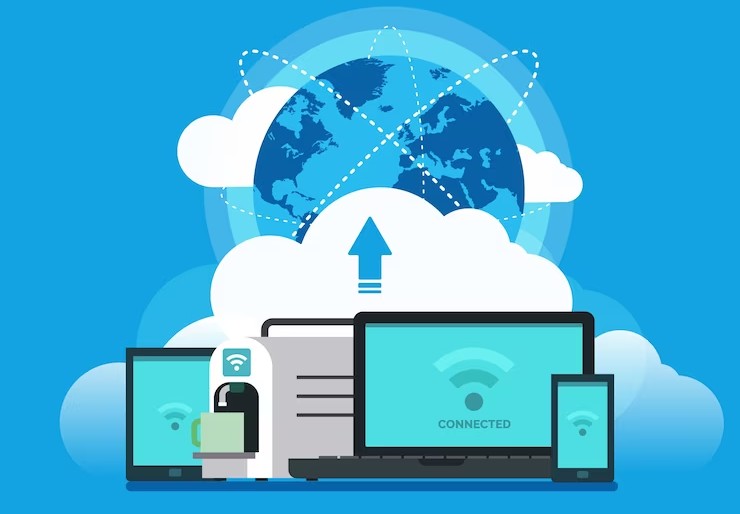Cloud Computing
- Home
- Cloud Computing
Cloud Computing
The cloud computing has quick solution for today’s businesses. SaaS (software as a service), PaaS (platform as a service), and IaaS (infrastructure as a service) are simply three ways to describe how you can use the cloud for your business.
At Aventus Software, we provide world-class solutions to help you keep up with the high demand for computing resources. Our cloud experts help your IT organization to better serve its business by conveying more adaptable solutions while setting you up for the future essentials and securing your hierarchical resources.


Benefits of Cloud Computing
Following are a few important benefits of cloud computing:
Scalability: Our cloud computing services allow businesses to scale their computing resources based on their requirements quickly.
Cost Savings: With cloud computing, businesses can save big money on upfront costs. They can also reduce expenses related to power and staff.
Easy Accessibility: Cloud computing solutions enable users to access their data from anywhere using the internet.
Security: Cloud providers are committed to ensuring that their computing services are protected against theft. So, businesses can rely on them to keep their important data safe.
Innovation: Cloud services allow businesses to leverage the latest technologies without investing in costly hardware or software.
Main Kinds of Cloud Computing
Infrastructure as a Service (IaaS)
This provides users with a platform for deploying and managing their own applications on this interface.
Platform as a Service (PaaS)
This refers to developing and managing applications without worrying about the infrastructure.
Software as a Service (SaaS)
This allows clients to access software applications from anywhere using the internet.
Cloud computing services are categorized into three main types i.e. public, private, and hybrid clouds. Public clouds are operated by third-party providers. Private clouds are operated by organizations. And a hybrid cloud is a combination of both private and public clouds.
Our experienced team is expertise in following cloud technologies.
- AWS
- Microsoft Azure
- Google Cloud

AWS
Amazon Web Services (AWS) is a cloud platform offering computing power, data storage, content delivery, security, and other functions to help businesses grow. This cloud service was once considered a cloud platform for large enterprises. AWS is now used by 80% of fortune 500 companies globally. At Aventus Software, our AWS developers understand your business requirements and offer AWS services accordingly. We provide one-stop solution for all kinds of cloud needs.
Microsoft Azure
Microsoft Azure commonly called Azure is cloud platform solution by Microsoft which provides more than 200 products and cloud services. Azure provides services like Database, Developer Tools, DevOps, Internet of Things, Mobile, Networking, Security, Storage etc. Our team is expertise in this platform. We, at Aventus Software, have rich experience in developing and managing Microsoft azure solutions. Looking to outsource Microsoft Azure development services? Schedule your appointment with us!
Google Cloud
Google Cloud Platform is a cloud computing service which is offered by Google. GCP provides services like Computing, Storage & Database, Networking, Big Data, Cloud AI, Management Tools, Identity & Security, IoT, API Platform etc. We, at Aventus Software, help our clients in availing these cloud services.

Why Choose Aventus Software For Cloud Services ?
- Proven, industry-tailored cloud solutions
- Matchless Talent and Experience
- Security Focused
- One-Stop Shop
- 100% Satisfaction Guarantee
- Quality Support
- Honest Pricing
Looking for reliable cloud support services? Our team of cloud experts is here to assist you every step of the way. Whether you’re a small business or a large corporation, we deliver consistent and efficient cloud solutions to our clients. Let us help you outsource your cloud computing needs and schedule an appointment with us today.
faq
Read Most Frequent Questions
Cloud computing services offer numerous advantages, including:
- Scalability and flexibility: Cloud services allow businesses to scale their computing resources up or down based on their needs. This flexibility enables cost savings and ensures that the system can handle increased demand.
- Cost-effectiveness: Cloud computing eliminates the need for upfront hardware and software investments. Instead, businesses pay for the resources they use, reducing capital expenses.
- Reliability and high availability: Cloud providers typically have robust infrastructure and redundancy measures in place, ensuring high uptime and availability of services.
- Ease of maintenance and updates: Cloud providers handle maintenance tasks, such as software updates and security patches, freeing up businesses from these responsibilities.
- Improved collaboration and remote access: Cloud services enable seamless collaboration among team members regardless of their location, facilitating remote work and enhancing productivity.
- Disaster recovery and data backup: Cloud providers offer robust disaster recovery mechanisms, including data replication and backup, ensuring business continuity and data protection.
- Enhanced security: Cloud providers employ advanced security measures, such as encryption, access controls, and regular audits, to protect data and systems from unauthorized access.
- Increased agility and innovation: Cloud computing enables rapid deployment of new applications and services, allowing businesses to quickly respond to market demands and innovate.
Cloud computing involves the delivery of computing resources, including servers, storage, databases, networking, and software applications, over the internet. The key components of cloud computing are:
- Cloud infrastructure: This includes the physical resources, such as servers, data centers, and networking equipment, that provide the foundation for cloud services.
- Virtualization: Cloud providers use virtualization technologies to create virtual instances of servers, storage, and other resources, allowing efficient resource utilization and scalability.
- Service models: Cloud computing offers various service models, including Infrastructure as a Service (IaaS), Platform as a Service (PaaS), and Software as a Service (SaaS). These models determine the level of control and management provided by the cloud provider.
- Deployment models: Cloud services can be deployed in different ways, including public cloud, private cloud, hybrid cloud, and multi-cloud environments. The deployment model determines who has access to the cloud resources and how they are managed.
- Internet connectivity: Cloud computing relies on high-speed internet connectivity to enable users to access and utilize cloud services from anywhere in the world.
- Service-level agreements (SLAs): Cloud providers offer SLAs that define the level of performance, availability, and support provided to customers.
The main types of cloud computing services are:
- Infrastructure as a Service (IaaS): IaaS provides virtualized computing resources, such as virtual machines, storage, and networks, allowing businesses to build and manage their own infrastructure within the cloud.
- Platform as a Service (PaaS): PaaS offers a platform for developing, testing, and deploying applications without the need to manage the underlying infrastructure. It provides tools, middleware, and runtime environments to streamline the development process.
- Software as a Service (SaaS): SaaS delivers fully functional software applications over the internet. Users can access and use these applications without the need for installation or maintenance, as the software is centrally managed by the provider.
- Serverless computing: Serverless computing abstracts the underlying infrastructure and allows developers to focus on writing code without worrying about server management. It automatically scales the application based on the incoming requests and charges based on usage.
- Containers and container orchestration: Containers provide lightweight and portable environments for running applications. Container orchestration platforms, such as Kubernetes, simplify the management and deployment of containers in a cloud environment.
- Function as a Service (FaaS): FaaS allows developers to write and deploy small, event-driven functions that execute specific tasks. The cloud provider manages the infrastructure and scales the functions automatically in response to events.
- Database as a Service (DBaaS): DBaaS offers managed database services, eliminating the need for businesses to set up and maintain their own database infrastructure. It provides scalability, high availability, and automated backups for databases.
Cloud computing services offer several advantages for small businesses, including:
- Cost savings: Small businesses can avoid high upfront costs associated with purchasing and maintaining hardware and software by leveraging cloud services. They can pay for resources on a pay-as-you-go basis, reducing capital expenses.
- Scalability: Cloud services allow small businesses to scale their computing resources based on their needs. They can easily add or remove resources as their business grows or experiences fluctuations in demand.
- Access to enterprise-level technology: Cloud computing provides small businesses with access to advanced technology, infrastructure, and software that might otherwise be cost-prohibitive. This enables them to compete with larger organizations on a more level playing field.
- Enhanced collaboration and productivity: Cloud services enable small businesses to collaborate seamlessly, regardless of the physical location of team members. This facilitates remote work and increases productivity.
- Improved data security: Cloud providers typically have robust security measures in place, including encryption, access controls, and regular backups, which can enhance data security for small businesses.
- Business continuity and disaster recovery: Cloud services offer built-in disaster recovery mechanisms, ensuring that small businesses can quickly recover from unexpected events and minimize downtime.
- Simplified IT management: Cloud computing reduces the burden of managing IT infrastructure for small businesses. Updates, maintenance, and security are handled by the cloud provider, allowing businesses to focus on their core activities.
While cloud computing offers numerous benefits, there are some potential risks and challenges to consider:
- Security and privacy concerns: Storing data and running applications in the cloud can raise concerns about data security, privacy, and the risk of unauthorized access. It's important to choose a reputable cloud provider with robust security measures.
- Dependence on internet connectivity: Cloud computing heavily relies on internet connectivity. If the internet connection is unstable or experiences downtime, it can disrupt access to cloud services and impact business operations.
- Vendor lock-in: Moving applications and data to the cloud can create vendor lock-in, making it difficult to switch to another provider or bring the services back in-house. It's essential to consider the portability of applications and data.
- Potential downtime and service disruptions: While cloud providers strive to maintain high availability, there is always a possibility of downtime or service disruptions. It's crucial to review the provider's service-level agreements (SLAs) and ensure they meet the business requirements.
- Compliance and regulatory considerations: Depending on the industry and location, there may be specific compliance and regulatory requirements that need to be addressed when using cloud services. It's important to assess whether the cloud provider complies with relevant regulations.
- Data migration and integration: Moving existing applications and data to the cloud can be complex, especially if there are dependencies or integration requirements. Proper planning and testing are crucial to ensure a smooth migration process.
- Cost management: While cloud computing can provide cost savings, it's important to monitor and manage usage to avoid unexpected costs. Businesses should optimize resource allocation and consider cost-optimization strategies provided by the cloud provider.
- Lack of control over infrastructure: With cloud computing, businesses rely on the cloud provider for infrastructure management. This means they have limited control over hardware, software, and security configurations.
- Potential for service outages: Cloud services are susceptible to outages caused by various factors, such as hardware failures, natural disasters, or cyberattacks. It's important to have backup plans and disaster recovery mechanisms in place.
- Data sovereignty and jurisdiction: When storing data in the cloud, businesses should consider data sovereignty and jurisdiction laws. It's important to understand where data is stored and ensure compliance with applicable data protection regulations.
Google has said for years that the most important single factor to
To ensure the security of data in the cloud, businesses can take the following measures:
- Choose a reputable cloud provider: Select a cloud provider with a strong reputation for security and privacy. Evaluate their security practices, certifications, and compliance with industry standards.
- Implement strong access controls: Use strong authentication mechanisms, such as multi-factor authentication, to control access to cloud resources. Enforce strong password policies and regularly review and update access privileges.
- Encrypt sensitive data: Encrypt data both in transit and at rest to protect it from unauthorized access. Use encryption protocols and algorithms recommended by industry best practices.
- Implement network security measures: Use firewalls, intrusion detection systems, and other network security tools to monitor and protect cloud resources from unauthorized network access and attacks.
- Regularly update and patch systems: Keep all cloud-based systems, including operating systems, applications, and software, up to date with the latest security patches and updates provided by the cloud provider.
- Back up data: Regularly back up critical data stored in the cloud to ensure business continuity and recovery in case of data loss or system failure.
- Monitor and log activities: Implement logging and monitoring mechanisms to detect and investigate any suspicious activities or security incidents. Monitor access logs, network traffic, and system logs for potential security breaches.
- Educate employees: Provide security awareness training to employees to educate them about best practices for data security in the cloud. Teach them about phishing threats, password hygiene, and safe data handling practices.
- Perform regular security assessments: Conduct periodic security assessments, penetration testing, and vulnerability scanning to identify and address any security weaknesses in the cloud environment.
- Implement data loss prevention measures: Deploy data loss prevention (DLP) solutions that can detect and prevent the unauthorized transmission of sensitive data outside the organization's cloud environment.
- Have a comprehensive incident response plan: Develop an incident response plan that outlines the steps to be taken in the event of a security breach or data compromise. Test the plan regularly and update it as needed.
is high quality content. Now more than ever, they have the ability.

